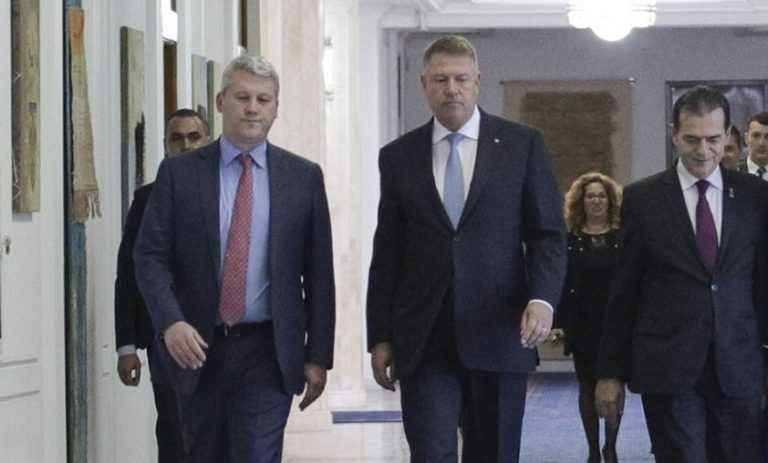
EXCLUSIV Raportul MCV critică România pentru că nu a desființat Secția Specială, pentru numirea procurorilor șefi la DIICOT și Parchetul General în ciuda avizului negativ al CSM/ Critici dure la adresa funcționării Consiliului Superior al Magistraturii și Inspecției Judiciare
Raportul MCV al Comisiei Europene, consultat de G4Media.ro, critică România pentru că nu a desființat Secția Specială, dar și pentru pentru numirea procurorilor șefi la DIICOT și Parchetul General în 2020 în ciuda avizului negativ al CSM.
Urmărește cele mai noi producții video G4Media
- articolul continuă mai jos -
”Cu amendamentele din 2018-2918 la legile Justiției încă în vigoare, îngrijorările legate de afectarea sistemului de justiție rămân valide”, arată raportul MCV al Comisiei Europene.
”În special, existența și funcționarea Secției Speciale pentru magistrați SIIJ rămâne o îngrijorare majoră”, mai arată Comisia Europeană.
În termeni de substanță, recomandările MCV indică o serie de zone la care Comisia Europeană va urmări cu atenție rezultatul amendării legilor justiției. Aceste zone sunt:
– desființarea SIIJ
– regimul sancțiunilor (disciplinare, civile și penale) în cazul magistraților
– numirea șefilor Inspecției Judiciare
– numirea și revocarea procurorilor-șefi
– rolul Curții Supreme și al CSM
– impactul reformelor în ce privește independența magistraților și organizarea carierei acestora
Alte fraze cheie din raportul MCV
- The legislative process for the various proposals for reform – on the SIIJ, the justice laws, and later the criminal code and criminal procedure code – is an opportunity to show that the approach of the recommendation is being followed.
- Critici la adresa Consiliului Superior al Magistraturii (SCM) pentru poziția ambiguă în ce privește desființarea SIIJ. Another example where the SCM has not been able to articulate a clear position and contribute to public debate is the reaction of the SCM to the draft law to dismantle the SIIJ. Although the draft law from the Minister of Justice was in line with the recommendations of the CVM, the Venice Commission and GRECO, the SCM gave a negative opinion on the draft and called for new safeguards, but despite the long-standing debate on this issue, it did not define what these should be
- Critici dure la adresa funcționării CSM. The public communication of the SCM, in particular on the independence of the judiciary, has also been a source of concern. The January 2017 report had noted that a pro-active approach by the SCM on the independence of justice was an important element towards fulfilling Benchmark one. CVM reports have noted that the SCM has not been able to provide a strong stance on the matter. Since the last report, the activity of the SCM in defending the independence of the judiciary remains limited.77 It made no comment after the landmark ruling from the European Court of Human Rights in May 2020, invoking the independence of the judiciary. There has also been confusion of roles between the Plenum
of the SCM – responsible under the Constitution for defending the independence of the justice system and for opinions on legislative proposals – and the sections. In many instances, the role of defence of th independence of the justice system has been taken up by the sections, instead of the Plenum. - Îngrijorări în ce privește funcționarea Inspecției Judiciare ca un instrument de presiune la adresa magistraților care critică direcția reformelor în justiție sau scurg informații în spațiul public. In the reporting period, judicial institutions reported an overall reduction in the activity of
the Judicial Inspection, namely fewer ex-officio disciplinary proceedings raising concerns about objectivity. However, there remain cases where disciplinary investigations and heavy sanctions on magistrates critical of the efficiency and independence of the judiciary have raised concerns.87 The delays from the part of the Judicial Inspection in examining complaints are also seen as a way to maintain pressure on the judge or prosecutor as long as the investigation is ongoing.
Whilst focused on the particular circumstances at the time of the 2018 report, this recommendation refers to substantial concerns about the Judicial Inspection. This included a pattern of disciplinary proceedings against magistrates publicly opposing the direction of reform of the judiciary and leaks of documents – which were then used by politicians to attack judicial institutions – as well as the prolongation of the management team. These structural concerns remain to be addressed, including in the light of the recent CJEU judgment.
Context
Reamintim că președintele Klaus Iohannis i-a numit pe Gabriela Scutea procuror general și pe Georgiana Hosu șefa DIICOT, la propunerea fostului ministru Cătălin Predoiu, în ciuda avizului negativ al CSM.
Citește aici raportul integral al Comisiei Europene
Foto: InquamPhotos / Octav Ganea

Donează lunar pentru susținerea proiectului G4Media
Donează suma dorită pentru susținerea proiectului G4Media
CONT LEI: RO89RZBR0000060019874867
Deschis la Raiffeisen Bank



37 comentarii